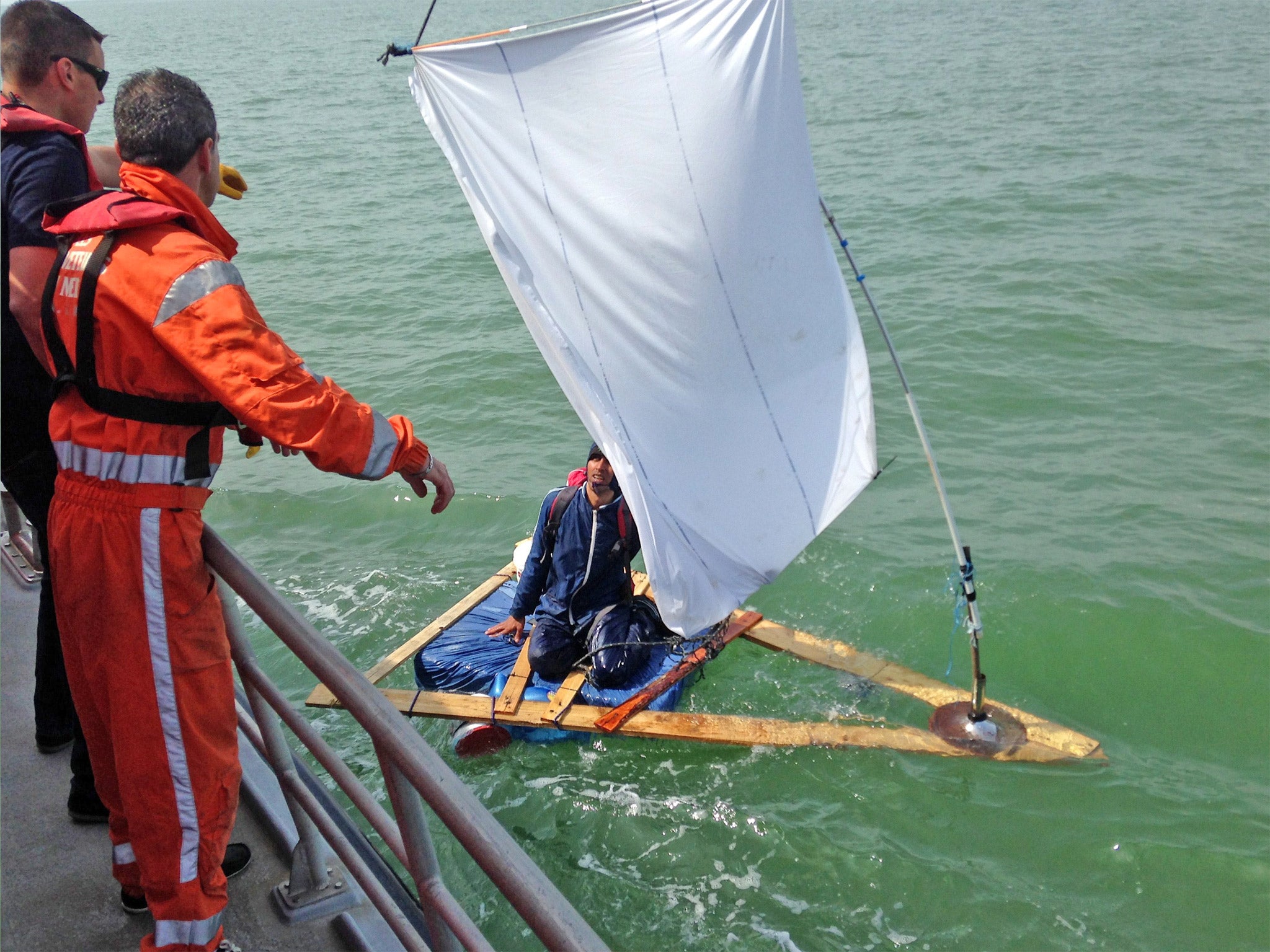Desperate Afghan migrant rescued in the English Channel on wooden raft with a bedsheet sail

Your support helps us to tell the story
From reproductive rights to climate change to Big Tech, The Independent is on the ground when the story is developing. Whether it's investigating the financials of Elon Musk's pro-Trump PAC or producing our latest documentary, 'The A Word', which shines a light on the American women fighting for reproductive rights, we know how important it is to parse out the facts from the messaging.
At such a critical moment in US history, we need reporters on the ground. Your donation allows us to keep sending journalists to speak to both sides of the story.
The Independent is trusted by Americans across the entire political spectrum. And unlike many other quality news outlets, we choose not to lock Americans out of our reporting and analysis with paywalls. We believe quality journalism should be available to everyone, paid for by those who can afford it.
Your support makes all the difference.For the Afghan migrant who fashioned together a raft from wooden slats and a table leg, it was his ticket to a new life in Britain. According to his rescuers, it was in reality a vessel fit only for sailing its captain to a watery grave.
In a grim reminder of the lengths to which the hundreds of migrants camped in the French port of Calais will go to reach English shores, the story emerged today of how a 23-year-old refugee was rescued while trying to steer a raft of six pieces of nailed wood with a bed sheet for a sail across the Channel.
The young Afghan, who was on the verge of hypothermia, was saved after he was spotted by the British crew of a Dover-bound P&O ferry, who alerted the French coastguard and stopped the vessel to protect the adventurer until help arrived while bank holiday day trippers looked on in astonishment.
French rescue services said that if the man had not been seen as he tried to cross the shipping lane used by car ferries approaching and leaving Calais on Monday morning, it is probable he would eventually have capsized and drowned in the cold Channel waters.
Bernard Barron, head of the Calais marine rescue service, which came to the man’s aid, said: “If the wind had picked up, even by just a single figure on the Beaufort scale, he would have capsized and drowned.”
The intrepid refugee, clad lightly in a windcheater jacket and carrying a rucksack containing his possessions, is said to have been “at first disappointed, then very happy” when his rescuers arrived.
Nailed together from scrap timber to form a triangular raft with a “seat” made from foam wrapped in a tarpaulin, the rudimentary vessel was fitted with a mast made from a fibreglass pole anchored to a table leg or a stand for a garden parasol.
It was powered by the bed sheet sail tied to another pole and held in place by hand as its builder departed from the beach in sight of Sangatte, the site of the notorious refugee camp that once housed 1,500 refugees at a time until it closed in 2002.
Experts said the man would have had no chance of reaching the English coast because of the prevailing currents, which head east through the Channel rather than across it, and the danger posed by the dozens of large ships crossing the world’s busiest shipping lane.
Mr Barron said: “It may be only 30 kilometres across but the currents are violent and there are many ships and tankers crossing the route. It was impossible for him to succeed. The current can reach six or seven knots - more than 10 kilometres an hour.”
With at least 400 migrants (or around 650 according to charities offering them help) gathered in makeshift, often squalid, camps in and around Calais, the pressure to take extreme risks to reach Britain is ever present as they attempt to beat both the UK’s border controls and frequent raids by French police.
The Independent has been told of one incident late last year where a man clung to a 30cm-wide metal strip around the base of a ferry for the entire 90-minute crossing from Calais to Dover. He was found by port staff, wandering disoriented by hypothermia.
Much of the human traffic around Calais is controlled by criminal gangs who smuggle refugees from trouble spots such as Syria, Afghanistan and Eritrea onto lorries for a fee of about €1,000 (£800).
Those unwilling or unable to pay resort to unorthodox tactics which range from risking death by strapping themselves to the axles of lorries to swimming across the dock at Calais to reach ferries or a car park where vehicles have already been screened, often with fatal consequences. Last October, an Eritrean man drowned as he tried to swim across Calais port while fatal road accidents involving migrants falling or jumping from vehicles happen with tragic regularity.
Attempts to sail across the Channel happen less frequently. In 2001, six people were rescued trying to cross in a small boat while a Ukrainian man perished while attempting to paddle to Britain in a two-man kayak.
A spokesman for P&O said: “The rafter was spotted from the Spirit of Britain yesterday morning on departure from Calais, in the Calais approach channel. The ship contacted the French authorities, who asked us to keep an eye on him until the Calais lifeboat could recover him.”
After his rescue the man was handed to the French border police and later released to return to his camp.
Join our commenting forum
Join thought-provoking conversations, follow other Independent readers and see their replies
Comments